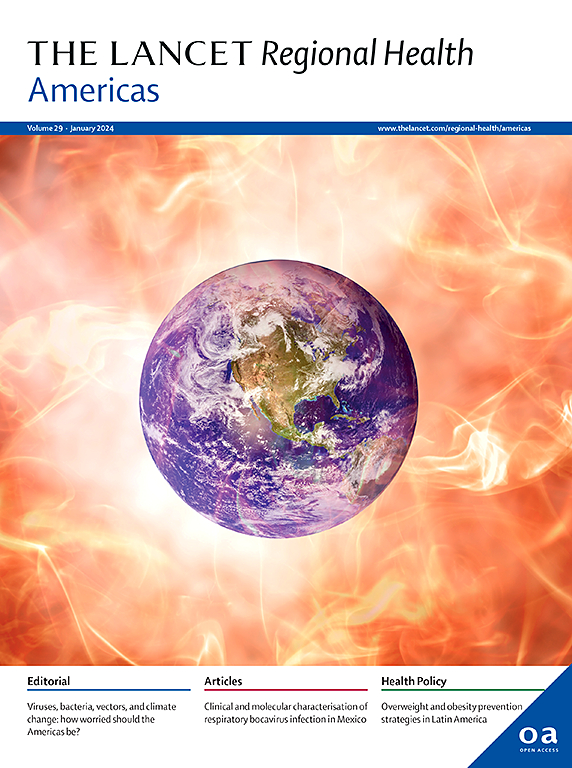Implications of adverse and benevolent childhood experiences on the physical and mental health of Mexican adults: a population-based study
IF 7
Q1 HEALTH CARE SCIENCES & SERVICES
引用次数: 0
Abstract
Background
Adverse childhood experiences (ACEs) are linked to negative physical and mental health outcomes. Limited information on their influence exists in Latin America and middle-income countries like Mexico. This study aimed to determine the prevalence and impact of ACEs and benevolent childhood experiences (BCEs) on Mexican population health.
Methods
From September to November 2023, this cross-sectional study recruited a nationally representative sample of adults aged 18–65, randomly selected from urban and rural areas. Sociodemographic data, ACEs, BCEs, physical and mental health history, and clinical assessments for depression, anxiety, post-traumatic stress disorder, and eating disorders were collected.
Findings
Of 1448 participants recruited, 1115 (77%) were women, 1278 (88·2%) reported at least one ACE, while 328 (22·6%) had four or more. Physical (840; 58·6%) and emotional neglect (518; 35·7%) were the most frequent. Four or more ACEs increased the odds of obesity (OR 1·8, 95% CI 1·2–2·8), hypertension (OR 1·6, 95% CI 1·1–2·2), depression (OR 4·7, 95% CI 3·6–6·1) and anxiety (OR 4·1, 95% CI 3·2–5·3) among others. Common BCEs included having at least one supportive caregiver (1298; 89·6%) and feeling comfortable with oneself (1272; 87·8%). BCEs decreased the odds of physical and mental health diagnoses.
Interpretation
ACEs are highly prevalent and significantly impact the health of Mexican population. BCEs protect against these effects. Considering ACEs in public policies can help establish interventions to prevent adversity and promote positive childhood experiences.
Funding
Fundación FEMSA, Centro de Primera Infancia from Tecnológico de Monterrey and Fundación FEMSA and Tecnologico de Monterrey Challenge-Based Research Funding Program 2022.
不良和善意的童年经历对墨西哥成年人身心健康的影响:一项基于人群的研究
不良童年经历(ace)与负面的身心健康结果有关。关于它们在拉丁美洲和墨西哥等中等收入国家的影响的信息有限。本研究旨在确定不良经历和善意童年经历(BCEs)对墨西哥人口健康的患病率和影响。方法:从2023年9月至11月,本横断面研究从城市和农村随机抽取了18-65岁的全国代表性样本。收集社会人口统计数据、ace、bce、身心健康史以及抑郁、焦虑、创伤后应激障碍和饮食失调的临床评估。在1448名参与者中,1115名(77%)是女性,1278名(88.2%)报告至少有一次ACE, 328名(22.6%)报告有四次或更多ACE。物理(840;58.6%)和情感忽视(518;35.7%)最为常见。4次或4次以上ace会增加肥胖(or 1.8, 95% CI 1.2 - 2·8)、高血压(or 1.6, 95% CI 1.1 - 2·2)、抑郁(or 4.7, 95% CI 3.6 - 6.1)和焦虑(or 4.1, 95% CI 3.2 - 5·3)等疾病的发生几率。常见的bce包括至少有一名支持性照顾者(1298;89.6%)和自我感觉舒适(1272;87·8%)。bce降低了身体和精神健康诊断的几率。口译ace非常普遍,对墨西哥人口的健康产生重大影响。bce可以防止这些影响。在公共政策中考虑不良经历可以帮助建立干预措施,以防止逆境和促进积极的童年经历。FundingFundación FEMSA,来自Tecnológico de Monterrey和Fundación FEMSA的初级金融中心和蒙特雷技术挑战研究资助计划2022。
本文章由计算机程序翻译,如有差异,请以英文原文为准。
求助全文
约1分钟内获得全文
求助全文
来源期刊

Lancet Regional Health-Americas
Multiple-
CiteScore
8.00
自引率
0.00%
发文量
0
期刊介绍:
The Lancet Regional Health – Americas, an open-access journal, contributes to The Lancet's global initiative by focusing on health-care quality and access in the Americas. It aims to advance clinical practice and health policy in the region, promoting better health outcomes. The journal publishes high-quality original research advocating change or shedding light on clinical practice and health policy. It welcomes submissions on various regional health topics, including infectious diseases, non-communicable diseases, child and adolescent health, maternal and reproductive health, emergency care, health policy, and health equity.
 求助内容:
求助内容: 应助结果提醒方式:
应助结果提醒方式:


